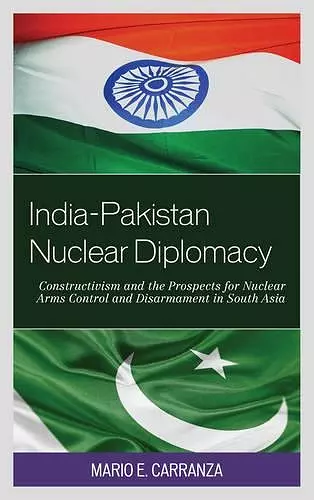India-Pakistan Nuclear Diplomacy
Constructivism and the Prospects for Nuclear Arms Control and Disarmament in South Asia
Format:Hardback
Publisher:Rowman & Littlefield
Published:15th Jul '16
Currently unavailable, and unfortunately no date known when it will be back

The conventional wisdom, based on realist premises, is that nuclear weapons are an irreversible reality in South Asia, and that efforts to denuclearize the subcontinent are a futile endeavor. As a result, real nuclear arms control in South Asia remains elusive and scholars continue focusing their efforts on how to achieve crisis stability and deterrence stability in future Indo-Pakistani confrontations. However, they tend to analyze India and Pakistan’s nuclear diplomacy as if the nuclear competition occurred in complete isolation from the changing dynamics of the international social environment. Using a constructivist model, this study brings nuclear arms control and disarmament back into the debates on the future of Indo-Pakistani relations. Constructivism recognizes the independent impact of international norms, such as the Nuclear Non-Proliferation Norm (NNPN), on India and Pakistan’s nuclear behavior. Even though the NNPN does not legally bind them, it is reinforced at the global level, and may lead the South Asian rivals to move in the direction of nuclear arms control and disarmament, thus reducing the costs, dangers, and risks of an eternal strategic rivalry. After examining the main tenets of constructivism in international relations, the works delves into the proliferation debate, discussing nuclear reversal and U.S. policy toward the subcontinent since the G. W. Bush administration. It looks at the prospects for nuclear arms control and disarmament in South Asia after the U.S.-India nuclear deal of 2008, and the nuclear abolitionist wave during the first Obama administration. It concludes with the contribution of social constructivism to understanding how changes in the India-Pakistan nuclear status quo can happen.
A thoughtful and well-wrought examination of the India-Pakistan nuclear relationship that offers hope that New Delhi and Islamabad may, in time, retreat from their nuclear stand-off. Through the robust application of the international relations theory, with an emphasis on constructivism, Carranza shows that the two states’ nuclear confrontation is not an inescapable dilemma, but one that can become more tractable over time, in particular, because of the influence of global norms against nuclear armaments. Students of IR theory will find Carranza’s in-depth application of this scholarly tool to a specific, high-profile case to be of particular value. -- Leonard S. Spector, deputy director, James Martin Center for Nonproliferation Studies, Middlebury Institute of International Studies
Carranza has written the most innovative assessment of South Asian nuclearization ever. Here at last the region has been released from the realist stranglehold. The result is the first completely persuasive explanation of why and how South Asian nuclear dangers can be averted. It is a book of great importance for South Asian nuclear policy and for nuclear studies everywhere. -- Aaron Karp, Old Dominion University
Conventional wisdom has long held that nuclear weapons acquisition by India and Pakistan is now irreversible. According to most mainstream analysts, the best that can be hoped for in the region is that the two states will find a path to a stable condition of mutual deterrence. Mario Carranza challenges both parts of this conventional wisdom. On the one hand, he argues that the situation in South Asia remains quite dangerous and that a condition of stable deterrence might never be achieved. On the other hand, Carranza also sounds a note of cautious optimism. Drawing on social constructivism, Carranza contends that India and Pakistan could achieve nuclear arms control agreements and improve their relations to make them less dangerous. For many years, Carranza has been a lonely voice arguing against the realist view that nuclear reversal will never be possible in South Asia, and this book both summarizes and extends his long engagement with the existing literature on the nuclear confrontation between India and Pakistan. -- Jeffrey W. Knopf, Professor of Nonproliferation and Terrorism Studies, Middlebury Institute of International Studies at Monterey, CA
India-Pakistan Nuclear Diplomacy delivers a comprehensive and up-to-date survey analysis of the developments and policy debate surrounding the nuclear weapons programs of two South Asian rivals since their tit-for-tat nuclear weapon test explosions of 1998. Carranza persuasively argues that contrary to established thinking, the risks posed by the two countries’ nuclear arsenals are growing as their nuclear competition accelerates. His assessment makes it clear why policy makers in the region and outside should redouble efforts to put in place practical nuclear risk reduction and confict avoidance measures to avert a potential nuclear catastrophe on the subcontinent. -- Daryl G. Kimball, Executive Director, Arms Control Association
Not only is this the best available guide to arcane academic debate between and among the pseudo-realists—who cannot agree on what “realism” actually means--but it is a wise and important guide to formulating policies that will contain and possibly reverse the frightening global expansion of nuclear weapons. This is especially important for South Asia, a region of competing, if imperfect democracies, and the site of numerous nuclear crises. Professor Carranza’s book is richly researched and tightly argued, it is invaluable for those who seek both policy guidance and methodological clarity. -- Stephen P. Cohen, Senior Fellow, The Brookings Institution
ISBN: 9781442245617
Dimensions: 237mm x 159mm x 27mm
Weight: 603g
288 pages